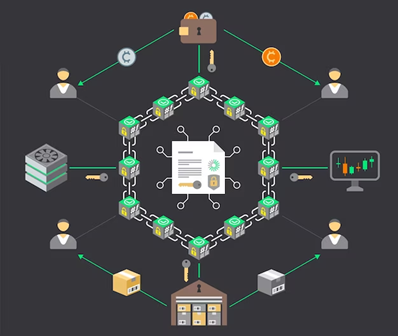Blockchain is an emerging technology with a huge array of potential applications. Blockchain has intrigued the corporate world in how it can reshape business processes. As shown by Sherlock Communications’ 2023 blockchain report, there is an increasing adherence of businesses to cryptocurrencies and blockchain-based solutions.
Enterprise blockchain, more specifically, is a blockchain network that enables the development of private, permissioned blockchain applications for large companies or organizations.
Unlike its counterpart, public blockchains, such as Bitcoin or Ethereum, where anyone can participate and view transactions, enterprise blockchain limits access to authorized participants.
It retains the benefits of blockchain technology while adding new benefits and opportunities, making it a valuable tool to empower businesses. According to the agency’s report on blockchain, blockchain-based services show an increased level of acceptance and adoption by Latin American businesses and organizations.
Here, we will explore the top 10 reasons why enterprise blockchain has become so popular among businesses, and how it can benefit your business.
1. Automation
Enterprise blockchain automates business processes by enabling secure, transparent and tamper-proof digital transactions. This automation further provides better-streamlined tasks, such as supply chain management, contract execution and financial settlements.
These types of blockchains use what’s called “smart contracts.” These ensure automatic execution, reducing manual intervention and enhancing efficiency across diverse industries. Additionally, these agreements reduce the need for intermediaries and paperwork.
These contracts can be viewed by all participants, which improves contract compliance. They can also trigger a specific action when predefined conditions are met, such as making payment upon delivery of all required documents.

2. Accountability
In an enterprise blockchain, each node in the network is known and can be held accountable for its actions. This accountability provides heightened trust and transparency.
Transparent and traceable transactions not only ensure clear accountability, but further reduce the possibilities of fraud and error. Because blocks in the network can be added but not removed, this creates a permanent, real-time record of every transaction.
Additionally, each stakeholder holds a copy of the transaction history, which provides data transparency. This fosters trust among stakeholders, enhances compliance and improves efficiency by maintaining a clear record of actions and responsibilities.

3. Transparency and trust
Enterprise blockchain offers a tamper-resistant and transparent ledger. Closely related to the accountability provided by these networks, it prompts trust among participants by providing a single source of truth for data that further ensures transparency.
This type of blockchain, as a private network, allows only participants to access the data. Data is further kept consistent through all nodes of the blockchain, meaning that every single network participant has access to the same information.
More importantly, the data is impervious to manipulation. Enterprise blockchain employs cryptographic hashing and consensus mechanisms across multiple nodes, making data tampering virtually impossible.

4. Security and data safety
As we mentioned above, users on an enterprise blockchain can only create and access blocks if they are authorized. This technology allows only trusted partners to access data. As a consequence, this promotes security and data safety, two key ingredients for the increased adherence to these types of networks, as indicated in this year’s Latin American blockchain report.
The cryptographic nature of blockchain makes enterprise blockchains able to ensure security by authenticating participants, controlling access, encrypting data and employing consensus mechanisms. In consequence, the chances of fraud and unauthorized access are eliminated.
Blockchain technology creates an encrypted record that can’t be changed and is linked to the previous transaction, therefore being immutable in nature. The security and safety provided by this network further help businesses guarantee the confidentiality, integrity and authenticity of transactions.

5. Efficiency
As we have seen before, the use of smart contracts on enterprise blockchains automates processes, reducing manual intervention and the need for intermediaries, thereby streamlining workflows and reducing costs.
This level of automation allows businesses to make faster transactions. Delays are further avoided and paperwork gets significantly reduced. All of this paves the way for businesses to enhance their efficiency, as well as streamline their operations.
Additionally, as enterprise blockchain networks eliminate the need to rely on third-party services, this can result in a significant time-saving and simplified exchange of data. All of this makes it possible to carry out faster and more efficient transactions.

6. Collaboration and traceability
As we reviewed, enterprise blockchains enable secure and real-time data sharing among stakeholders. This facilitates collaboration, improves communication and accelerates decision-making.
It enables multiple parties to have access to the same, up-to-date data. This presents a huge business advantage, as a lot of time can be spent reconciling data and updates on a daily, weekly, or monthly basis.
With enterprise blockchain, businesses can access at all times the digital records to trace their specific operations. And because of the blockchain features, businesses can rely on the data, knowing it is not malicious or tampered with.

7. Auditing and compliance
Another key characteristic of enterprise blockchain is the fact that data in the blockchain also has a verifiable audit trail. By creating an immutable, transparent and tamper-proof record of all transactions, auditing can be enhanced.
And because enterprise blockchains provide transparent and immutable records of transactions, they help simplify the auditing process, hence minimizing errors and discrepancies. Moreover, the use of smart contracts enforces compliance rules, which enforce adherence to regulations.
Blockchain’s traceable nature enables real-time monitoring, simplifies audits and facilitates regulatory reporting. This streamlines processes and reduces errors. Overall, it promotes trust, accountability and efficiency in meeting compliance requirements within a secure and controlled ecosystem.

8. Interoperability and scalability
Blockchain can facilitate interoperability between different ecosystems and organizations, enabling smoother data exchange and integration. It enables enhancing compatibility, data sharing and functionality across the various components of the blockchain ecosystem. By increasing visibility and ease of tracking, enterprise blockchain enables businesses to make smart and informed decisions.
On the same line, it can easily – and sometimes even instantly – scale as needed. This enables it to handle a higher volume of transactions while maintaining security and performance within the network.
Scalability is enhanced through mechanisms like sharding, sidechains and optimized consensus algorithms. These approaches allow businesses to distribute transaction processing and reduce network congestion.

9. Innovation
Enterprises can explore new business models, services and revenue streams through blockchain-based solutions. These offer a fertile ground for businesses to introduce innovations.
The modular and customizable nature of enterprise blockchains allows businesses to tailor solutions to their specific needs. Moreover, because of the secure and private nature of the network, it encourages experimentation without the risk of exposing sensitive data.
By leveraging these features, businesses can reimagine processes, develop novel applications and uncover innovative avenues that have the potential to reshape industries and markets.

10. Cost savings
When deployed properly, enterprise blockchain technology can save companies millions of dollars. This is possible as it eliminates intermediaries, reduces errors and improves efficiency.
For instance, businesses wouldn’t need to invest so much in data management and security, given the secure nature of blockchains. Companies can also save money with blockchain technology in customer identity verification.
Moreover, blockchain eliminates intermediaries that businesses would traditionally use for transactions. No additional vendors and third-party providers can be translated into lower costs for all traders on the blockchain.

As we have shown, enterprise blockchains offer many benefits for businesses. This explains the increased adoption of blockchain-based solutions, which is also revealed in Sherlock Communications’ report on blockchain in Latin America.
As technology matures, businesses adapt their operations accordingly to increase efficiency and output. The benefits of enterprise blockchain make it worth investing some time in researching these innovative technology solutions, and learning how your business can benefit from them as well.

